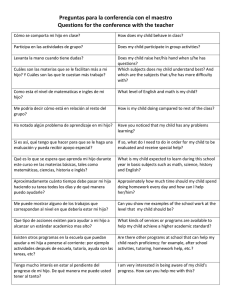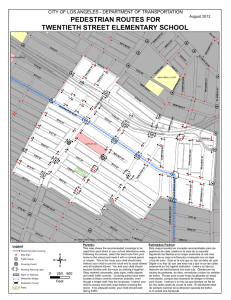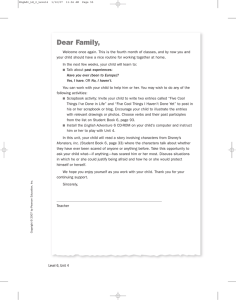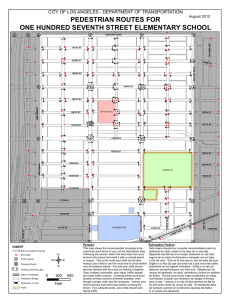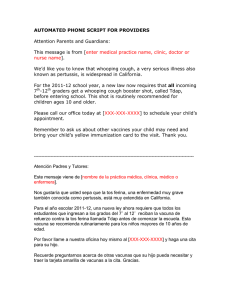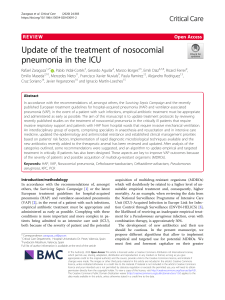Pneumonia in Children - Spanish - Health Information Translations
Anuncio
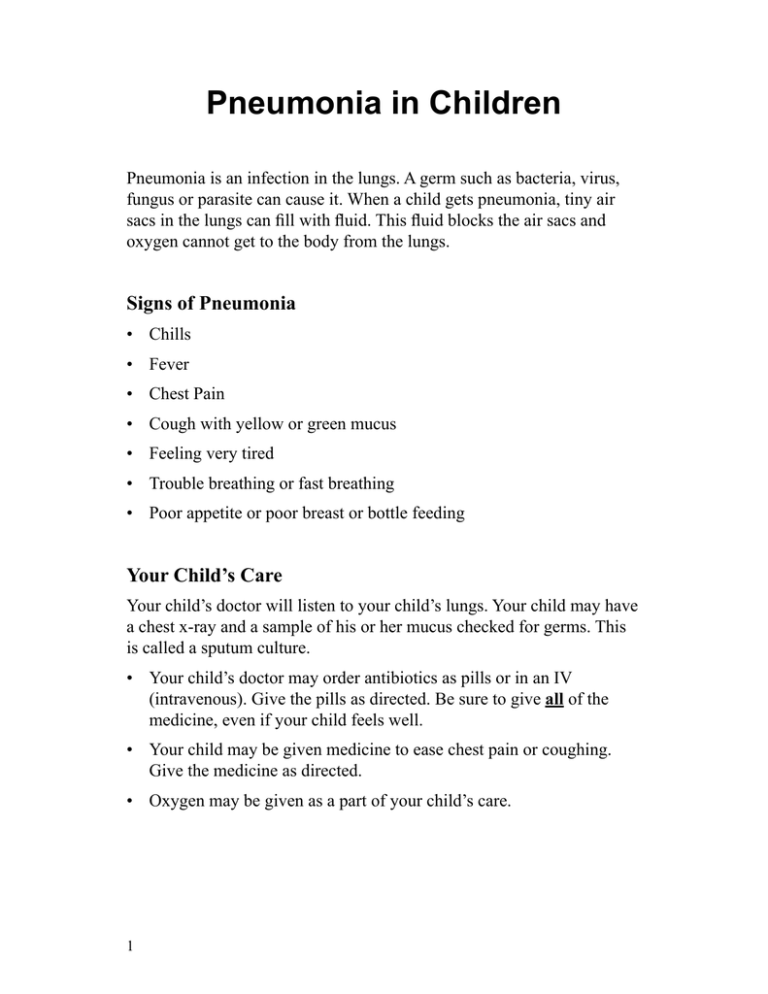
Pneumonia in Children Pneumonia is an infection in the lungs. A germ such as bacteria, virus, fungus or parasite can cause it. When a child gets pneumonia, tiny air sacs in the lungs can fill with fluid. This fluid blocks the air sacs and oxygen cannot get to the body from the lungs. Signs of Pneumonia • Chills • Fever • Chest Pain • Cough with yellow or green mucus • Feeling very tired • Trouble breathing or fast breathing • Poor appetite or poor breast or bottle feeding Your Child’s Care Your child’s doctor will listen to your child’s lungs. Your child may have a chest x-ray and a sample of his or her mucus checked for germs. This is called a sputum culture. • Your child’s doctor may order antibiotics as pills or in an IV (intravenous). Give the pills as directed. Be sure to give all of the medicine, even if your child feels well. • Your child may be given medicine to ease chest pain or coughing. Give the medicine as directed. • Oxygen may be given as a part of your child’s care. 1 Neumonía en los niños La neumonía es una infección de los pulmones. Puede ser causada por gérmenes como bacterias, virus, hongos o parásitos. Cuando un niño tiene neumonía, los pequeños alvéolos en los pulmones se pueden llenar con líquido. Este líquido obstruye los alvéolos y el cuerpo no puede obtener suficiente oxígeno de los pulmones. Signos de neumonía • Escalofríos • Fiebre • Dolor en el pecho • Tos con mucosidad amarilla o verde • Sensación de mucho cansancio • Problemas para respirar o respiración acelerada • Poco apetito o no querer amamantarse o tomar el biberón El cuidado de su hijo El médico de su hijo escuchará los pulmones del niño. Es posible que le tomen una radiografía de tórax y una muestra de la mucosidad para detectar gérmenes. Esto se conoce como cultivo de esputo. • El médico de su hijo puede indicar antibióticos como píldoras o en forma intravenosa (IV). Dele las píldoras según las indicaciones. Asegúrese de darle todo el medicamento, aunque su hijo se sienta bien. • Le pueden dar un medicamento para aliviar el dolor en el pecho o la tos. Dele los medicamentos según las indicaciones. • Como parte del tratamiento de su hijo le pueden administrar oxígeno. Pneumonia in Children. Spanish. 1 • Your child’s doctor may ask him or her to cough and deep breathe every 2 hours while awake to remove mucus. Have your child spit any mucus coughed up into a tissue and throw it away. Do not let your child swallow mucus if possible. • Make sure your child gets plenty of rest. • Have your child drink water. Ask your child’s doctor how much to give. • Keep all appointments with your child’s doctor. Follow up with your child’s doctor within 7 days, even if your child is feeling better. To prevent pneumonia: • Teach your children to wash their hands before eating and after using the toilet. • Keep your children away from people who are smoking. • Make sure your children get all of their vaccines or shots: ff ff All children 2 years and younger should get the PCV vaccine to protect against pneumonia. Children older than 2 years may need a different type of vaccine. Check with your children’s doctor. To limit your children’s risk of pneumonia, have them get a flu shot every fall. You can get pneumonia from the flu. • Make sure your children are eating a healthy diet that includes fruits, vegetables and whole grain foods. • Make sure your children are getting plenty of sleep. 2 • El médico de su hijo le pedirá que tosa y respire profundamente cada 2 horas mientras está despierto para eliminar las mucosidades. Procure que su hijo escupa las mucosidades en un pañuelo de papel y bótelo a la basura. No deje que su hijo se trague las mucosidades, de ser posible. • Asegúrese de que su hijo descanse mucho. • Procure que su hijo beba agua. Pregúntele al médico cuánta darle. • Asista a todas las citas con el médico de su hijo. Asista a un control con el médico en 7 días, incluso si su hijo se siente mejor. Para prevenir la neumonía: • Enséñeles a sus hijos a lavarse las manos antes de comer y después de ir al baño. • Mantenga a sus hijos alejados de las personas que fuman. • Asegúrese que sus hijos reciban todas las vacunas: ff ff todos los niños de 2 años o menores deben recibir la vacuna antineumocócica conjugada (VNC) para protegerse contra la neumonía. Los niños mayores de 2 años pueden necesitar un tipo de vacuna diferente. Consulte al médico de su hijo; para limitar el riesgo de neumonía de su hijo, vacúnelo contra la gripe cada otoño. Usted puede contraer neumonía debido a la gripe. • Asegúrese de que sus hijos consuman una dieta saludable que incluya frutas, verduras y alimentos integrales. • Asegúrese de que sus hijos duerman lo suficiente. Pneumonia in Children. Spanish. 2 Call your child’s doctor right away if your child has: • Chest pain when he or she breathes • Long coughing spells • Trouble breathing or fast breathing • Nausea and vomiting • A high fever that comes on quickly or a fever that lasts more than 1 to 2 days • Confusion Talk to your doctor or nurse if you have any questions or concerns. 2007 – 11/2011 Health Information Translations Unless otherwise stated, user may print or download information from www.healthinfotranslations.org for personal, non-commercial use only. The medical information found on this website should not be used in place of a consultation with your doctor or other health care provider. You should always seek the advice of your doctor or other qualified health care provider before you start or stop any treatment or with any questions you may have about a medical condition. The Ohio State University Medical Center, Mount Carmel Health System, OhioHealth and Nationwide Children’s Hospital are not responsible for injuries or damages you may incur as a result of your stopping medical treatment or your failure to obtain medical treatment. 3 Llame al médico de su hijo inmediatamente si este tiene: • dolor de pecho cuando respira; • largos ataques de tos; • problemas para respirar o respiración acelerada; • náuseas y vómitos; • fiebre alta que aparece repentinamente o fiebre que dura más de 1 o 2 días; • confusión. Hable con su médico o enfermera si tiene alguna pregunta o duda. 2007 – 11/2011 Health Information Translations Unless otherwise stated, user may print or download information from www.healthinfotranslations.org for personal, non-commercial use only. The medical information found on this website should not be used in place of a consultation with your doctor or other health care provider. You should always seek the advice of your doctor or other qualified health care provider before you start or stop any treatment or with any questions you may have about a medical condition. The Ohio State University Medical Center, Mount Carmel Health System, OhioHealth and Nationwide Children’s Hospital are not responsible for injuries or damages you may incur as a result of your stopping medical treatment or your failure to obtain medical treatment. Pneumonia in Children. Spanish. 3
